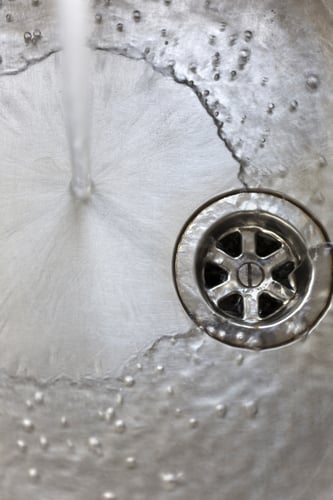Water taste and smell
The taste of tap water varies depending on the type of water source and its composition.
Hard water containing higher levels of dissolved natural minerals, like in the Bristol Water area, will have a different taste to softer water in places like Cornwall, Wales, and Scotland.
In general, tap water should have no noticeable taste or smell to it. The exception to this is a taste or smell of chlorine, which we add at the end of the treatment process to help keep the water safe to drink.
Unusual tastes and smells to tap water are very often caused by issues with plumbing in the home.
Chemical, antiseptic or metallic like tastes and smells
This is a common problem caused by chlorine in tap water reacting with plumbing fittings like flexible hoses and tap washers. This can give water a horrible taste, especially in boiled water, cups of tea, or when it’s left to stand in a glass. Although the taste can be unpleasant, it’s not considered harmful to health.
The most common cause is the hose supplying water to a dishwasher or washing machine – especially in newly installed hoses. Compounds form in the water left in the hose when the appliance isn’t being used. If the hose has been installed incorrectly (without a non-return valve at the branch) the water in the hose can flow back out of the hose to mix with your tap water when you turn on your tap. You can check if this is the cause by turning off the water to your appliances at the little blue isolation valve where the hose connects to the water supply (usually under the kitchen sink).
Run your tap for a few minutes then taste the water. If the taste is no longer noticeable then it’s likely the hose is the cause. You should fit a non-return valve before the hose branches off to prevent backflow.
If the taste and smell is only noticeable in boiled water, it may be forming in your kettle. This is a common problem in new kettles and the taste may improve with regular use. You can check if your kettle is the cause by comparing water boiled in a clean metallic saucepan. If there’s no taste to it, it’s likely the kettle is the culprit.
Sometimes taps can be the cause – tap washers, braided flexible connection hoses, or any rubber fitting. In this case, the tap arrangement may need replacing. All plumbing fittings and materials that come into contact with tap water should comply with the Water Supply (Water Fittings) Regulations 1999 to reduce the risk of causing water quality problems. Look out for approval markings on the fitting and its packaging when buying new ones.
Use a contractor approved by the WaterSafe scheme for plumbing work, who are qualified to work to these regulations.
Metallic or bitter tastes
Occasionally, increased levels of metals found in plumbing systems, like copper, can cause a bitter or metallic taste to tap water. This may arise after plumbing work or fitting new pipes. Try running your taps to clear it. If you’ve had work done on your hot water or heating system, make sure the filling loop (the pipe used to top up your central heating system) on your boiler has been left disconnected or isolated otherwise this can cause water quality problems.

Woody taste
This sort of taste is associated with older black plastic supply pipes laid in the 1960s and 1970s. Compounds released from the pipe over time can give water a distinctive woody or pencil taste, especially when water has been standing in the pipe for long periods – the taste may be especially noticeable first thing in the morning. Running your tap for a few minutes should clear the taste, but the only way to resolve the issue is to replace your pipe.

Petrol, fuel or oily tastes and smells
A fuel or solvent taste or smell, particularly after a known spillage incident, might mean your water supply has been contaminated. Compounds in petrol, diesel, oil, and solvents can pass through some types of pipe material. Please contact us if you suspect this has happened so we can investigate.

Earthy, musty, stale or eggy tastes and smells
Firstly, check if the taste or smell is in your tap water or is coming from your household drains. Take a glass of water into another room to see if it’s still noticeable. If it isn’t, the smell is likely to be coming from your drains when trapped food and waste is disturbed by water running down the plughole. Try cleaning out the waste traps under your sink.
If the smell or taste is in the water itself, try running the tap to see if it improves. Water can develop a musty, earthy taste or smell if it’s left standing in pipework for long periods, especially in dead end pipes with no or low turnover.
Very occasionally, an earthy or musty taste or smell may be noticeable in the warmer months. This could be caused by harmless natural changes in the source water. Contact us if running your taps doesn’t clear the taste or smell.
